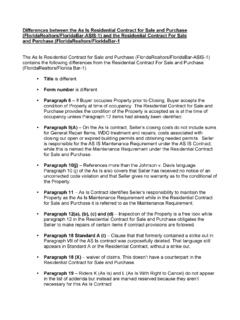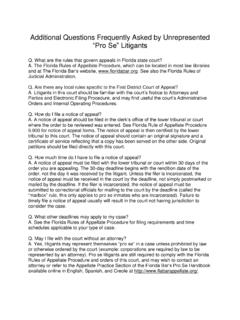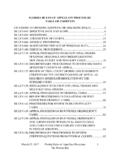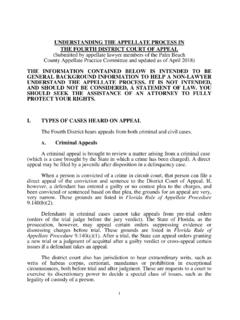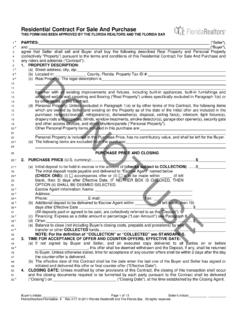Transcription of Adverse Possession - PolkPa.org
1 The following information regarding Adverse Possession is being provided to assist in understanding the Adverse Possession process. Our office does not give legal advice and this information should not be construed as such. The Florida Statutes and pertaining to Adverse Possession may be viewed at Adverse Possession Typically, ownership of a property is established by a deed or other legal document verifying the owner's legal title to the property. Adverse Possession is a means of attempting to gain legal title to property by continuous Possession of the property for at least seven successive years in an open, notorious, and visible manner such that it conflicts with the owner's right to the property. In addition to the seven year requirement, Florida law requires that an Adverse possessor meet either of the two following requirements: Adverse Possession under Color of Title: The Adverse Possession claimant must have some sort of title on which to base a claim of title.
2 Adverse Possession without Color of Title: The Adverse Possession claimant has no claim to title and must have paid property taxes on the land claimed to be adversely possessed. Adverse Possession without Color of Title The definition of Adverse Possession without Color of Title is taken from Florida Statute When the occupant or those under whom the occupant claims have been in actual continued occupation of real property for 7 years under a claim of title exclusive of any other right, but not founded on a written instrument, judgment, or decree, the property actually occupied shall be held adversely if the person claiming Adverse Possession made a return of the property by proper legal description to the property appraiser of the county where it is located within 1 year after entering into Possession and has subsequently paid all taxes and matured installments of special improvement liens levied against the property by the state, county and municipality. When an individual continuously occupies a property for seven consecutive years, without a legal document to support a claim to the land's title, he may establish Adverse Possession by doing both of the following: 1.
3 Filing a return (DR-452) including a full and complete legal description with the county appraisers within one year of entry onto the property. NOTE: Per Florida Statute our office is required to accept a claim of Adverse Possession when presented to this office. We are not required to substantiate the claim, and do not take it upon ourselves to make that determination. We are required by the statute to notify the owner of record so they are aware that a claim of Adverse Possession has been filed against their property and can seek legal advice. 2. Paying all taxes and liens assessed during Possession of the property The property is considered adversely possessed only if the individual cultivated or improved the land, protected the land by a substantial enclosure, which is usually a fence, or occupied and maintained the property. Adverse Possession under Color of Title Florida Statute , relating to Adverse Possession under Color of Title, reads as follows: When the occupant, or those under whom the occupant claims, entered into Possession of real property under a claim of title exclusive of any other right, founding the claim on a written instrument as being a conveyance of the property, or on a decree or judgment, and has for 7 years been in continued Possession of the property included in the instrument, decree, or judgment, the property is held adversely.
4 If the property is divided into lots, the Possession of one lot shall not be deemed a Possession of any other lot of the same tract. Adverse Possession commencing after December 31, 1945, shall not be deemed Adverse Possession under color of title until the instrument upon which the claim of title is founded is recorded in the office of the clerk of the circuit court of the county where the property is located. An Adverse possessor can claim property under color of title if he meets the following two conditions: 1. The Adverse possessor must show that the claim of title to the land is based on a recorded written document (even if faulty). The Adverse possessor must genuinely believe this document to be the correct claim of title. NOTE: This sometimes occurs when a record owner dies and the owners' heirs convey the property to another person without probating the estate first to establish the heirs of the estate. We normally suggest that the occupant see an attorney before filing their Adverse Possession under color of title claim as this sometimes can be cleared up with a simple probate of an estate.
5 2. The Adverse possessor must show Possession of the property by doing one of the following to the land for at least seven years: a. cultivating or making improvements; b. protecting by a substantial enclosure (usually a fence). Frequently Asked Questions: (1) How do I remove the Adverse Possession claim from my property? Answer: The owner of record cannot remove the Adverse Possession claim from their property. The only person who can remove it is the Adverse Possession claimant or a judge. If the claimant wants to remove their claim of Adverse Possession , our office will provide them with a form they can complete, sign, and have notarized requesting that the claim be removed. The Adverse Possession claimant can also sign a Quit Claim deed which will remove their claim. (2) How can you remove my name from this property and put it in the name of the Adverse Possession claimant? Answer: We can't without a court order or a deed. The only way we can remove the name of the owner of record is if the Adverse Possession claimant goes to court and the judge awards the property to him.
6 In that case, we are required to change the ownership in compliance with the court order. We also can change the ownership if the Adverse Possession claimant receives a deed from the current owner of record. (3) How can I protect myself from this claim? Answer: The owner of record can pay their annual tax bill prior to April 1 each year. Because of statute changes that occurred on July 1, 2011 any tax payment made by the owner of record will take priority over a tax payment made by the Adverse possessor if the owner pays the tax bill prior to April 1. We also highly suggest that the owner of record obtain legal advice from an attorney regarding the best course of action. Our office cannot give any legal advice nor can we refer anyone to a specific attorney. If you do not have an attorney, you can contact the Florida Bar Association, , to request assistance in locating an attorney to take your case. (4) I'm paying my taxes, not the Adverse Possession claimant.
7 How can he say he's paying my taxes? Answer: The Adverse Possession claimant is required to pay the taxes for 7 successive years after he/she has filed the claim of Adverse Possession . You will need to keep your tax payment information in case you need to go to court to prove you are paying taxes. We suggest that you pay your taxes between November 1st and no later than March 31. of the year following your tax assessment each year to insure that the taxes are paid timely. The Polk County Tax Collector accepts payment of taxes by phone and online. You can log onto the Tax Collector website for E-Services and online payment information at (5) How can I get the Adverse Possession claim removed from my property? According to the statute an Adverse Possession claim can be removed one of four ways: a) The person claiming Adverse Possession notifies the property appraiser in writing that their Adverse Possession claim is withdrawn;. b) The owner of record provides a certified copy of a court order entered after the date of the claim establishing title in the owner of record.
8 C) The property appraiser receives a certified copy of a recorded deed, filed after submission of the Adverse Possession claim, from the person claiming Adverse Possession to the owner of record describing the same property subject to the Adverse Possession claim;. d) The owner of record or the tax collector provides to the property appraiser a receipt demonstrating that the owner of record has paid the annual tax assessment for the property subject to the Adverse Possession claim during the period that the person is claiming Adverse Possession . According to if the Adverse Possession claimant pays the taxes on a parcel and then the owner of record pays his/her taxes prior to April 1st the tax payment made by the Adverse Possession claimant will be refunded and their Adverse Possession claim can be removed. Note: Statutory changes that took effect July 1, 2011 apply to Adverse Possession claims in which the return was submitted on or after that date, except for the procedural provisions governing the property appraiser's administration of Adverse Possession claims included in s.
9 (4)(c) and (d) and (7), Florida Statutes, and the provisions governing the payment of taxes included in s. , Florida Statutes, as created by this act, which apply to Adverse Possession claims for which the return was submitted before, on, or after that date.

